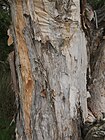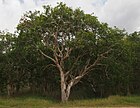Note: This is a project under development. The articles on this wiki are just being initiated and broadly incomplete. You can Help creating new pages.
Difference between revisions of "Melaleuca viridiflora - Broad leaved paperbark"
(→How to plant/cultivate) |
(→External Links) |
||
| (24 intermediate revisions by 2 users not shown) | |||
| Line 1: | Line 1: | ||
| − | |||
| − | |||
[[File:Melaleuca viridiflora foliage and fruit.jpg|thumb|right|''Melaleuca viridiflora'', ''Broad-leaved paperbark'']] | [[File:Melaleuca viridiflora foliage and fruit.jpg|thumb|right|''Melaleuca viridiflora'', ''Broad-leaved paperbark'']] | ||
| − | '''Broad-leaved paperbark''' commonly known as Melaleuca viridiflora is a plant in the myrtle family | + | '''Broad-leaved paperbark''' commonly known as Melaleuca viridiflora is a plant in the myrtle family and is native to woodlands, swamps and streams of monsoonal areas of northern Australia and New Guinea. |
==Uses== | ==Uses== | ||
| − | {{Uses| | + | {{Uses|Cough}}, {{Uses|Colds}}, {{Uses|Congestion}}, {{Uses|Headache}}, {{Uses|Fever}}, {{Uses|Influenza}}, {{Uses|Melaleuca viridiflora}}, {{Uses|Pimples}}, {{Uses|Diarrhea}}, {{Uses|Sore throats}} |
==Parts Used== | ==Parts Used== | ||
| − | {{Parts Used| | + | {{Parts Used|Leaves}}, {{Parts Used|Twigs}}. |
==Chemical Composition== | ==Chemical Composition== | ||
| − | + | The main chemical components of niaouli oil are 1,8-cineole, y-terpineol, limonene, a-phellandrene, a and b pinene, linalool and piperitone<ref name="chemical composition"/> | |
==Common names== | ==Common names== | ||
| − | {{Common names|kn=|ml=|sa=|ta=|te=|hi=|en= | + | {{Common names|kn=|ml=|sa=|ta=|te=|hi=|en=Broad leaved paperbark}} |
| + | |||
| + | ==Properties== | ||
| + | Reference: Dravya - Substance, Rasa - Taste, Guna - Qualities, Veerya - Potency, Vipaka - Post-digesion effect, Karma - Pharmacological activity, Prabhava - Therepeutics. | ||
| + | ===Dravya=== | ||
| + | |||
| + | ===Rasa=== | ||
| + | |||
| + | ===Guna=== | ||
| + | |||
| + | ===Veerya=== | ||
| + | |||
| + | ===Vipaka=== | ||
| + | |||
| + | ===Karma=== | ||
| + | |||
| + | ===Prabhava=== | ||
==Habit== | ==Habit== | ||
| − | {{Habit| | + | {{Habit|Shrub}} |
==Identification== | ==Identification== | ||
| Line 43: | Line 57: | ||
==Commonly seen growing in areas== | ==Commonly seen growing in areas== | ||
| − | {{Commonly seen| | + | {{Commonly seen|Northern tropical area}}, {{Commonly seen|Along streams}}, {{Commonly seen|Open woodlands}}. |
==Photo Gallery== | ==Photo Gallery== | ||
<gallery class="left" caption="" widths="140px" heights="140px"> | <gallery class="left" caption="" widths="140px" heights="140px"> | ||
| − | + | Flower of Melaleuca viridiflora (red-flowering form).JPG | |
| − | + | Melaleuca viridiflora 7286.jpg | |
| − | + | Melaleuca viridiflora bark.jpg | |
| − | + | Melaleuca viridiflora foliage.jpg | |
| + | Melaleuca viridiflora habit.jpg | ||
| + | Melaleuca viridiflora.jpg | ||
</gallery> | </gallery> | ||
| Line 56: | Line 72: | ||
<references> | <references> | ||
| − | <ref name="chemical composition">[https:// | + | <ref name="chemical composition">[https://allbeautynhealth.com/Niaouli-Melaleuca-Viridiflora-Melaleuca-Quinquenervia "Chemical composition"]</ref> |
| − | <ref name="Leaf">[http://anpsa.org.au/m-vir.html " | + | <ref name="Leaf">[http://anpsa.org.au/m-vir.html "General Description"]</ref> |
| − | + | <ref name="How to plant/cultivate">[http://tropical.theferns.info/viewtropical.php?id=Melaleuca+viridiflora "Cultivation Details"]</ref> | |
| − | <ref name="How to plant/cultivate">[http:// | ||
</references> | </references> | ||
==External Links== | ==External Links== | ||
| − | + | * [https://www.ncbi.nlm.nih.gov/pmc/articles/PMC1360273/ Melaleuca alternifolia (Tea Tree) Oil: a Review of Antimicrobial and Other Medicina Properties] | |
| + | * [https://uses.plantnet-project.org/en/Melaleuca_quinquenervia_(PROSEA) Melaleuca viridiflora on plantnet-project.org] | ||
| + | * [http://ayurvedicoils.com/tag/chemical-constituents-of-niaouli-oil Melaleuca viridiflora on ayurvedic oils] | ||
| + | * [https://sites.google.com/site/lemuressens/niaouli-essential-oil-melaleuca-viridiflora Melaleuca viridiflora on Niaouli Essential Oil] | ||
| + | * [https://www.quinessence.com/blog/niaouli-essential-oil quinessence of Melaleuca viridiflora] | ||
[[Category:Herbs]] | [[Category:Herbs]] | ||
| + | [[Category:Ayurvedic herbs that don't have seed photos]] | ||
| + | [[Category:Myrtaceae]] | ||
Latest revision as of 16:05, 24 May 2019
Broad-leaved paperbark commonly known as Melaleuca viridiflora is a plant in the myrtle family and is native to woodlands, swamps and streams of monsoonal areas of northern Australia and New Guinea.
Contents
- 1 Uses
- 2 Parts Used
- 3 Chemical Composition
- 4 Common names
- 5 Properties
- 6 Habit
- 7 Identification
- 8 List of Ayurvedic medicine in which the herb is used
- 9 Where to get the saplings
- 10 Mode of Propagation
- 11 How to plant/cultivate
- 12 Commonly seen growing in areas
- 13 Photo Gallery
- 14 References
- 15 External Links
Uses
Cough, Colds, Congestion, Headache, Fever, Influenza, Melaleuca viridiflora, Pimples, Diarrhea, Sore throats
Parts Used
Chemical Composition
The main chemical components of niaouli oil are 1,8-cineole, y-terpineol, limonene, a-phellandrene, a and b pinene, linalool and piperitone[1]
Common names
| Language | Common name |
|---|---|
| Kannada | |
| Hindi | |
| Malayalam | |
| Tamil | |
| Telugu | |
| Marathi | NA |
| Gujarathi | NA |
| Punjabi | NA |
| Kashmiri | NA |
| Sanskrit | |
| English | Broad leaved paperbark |
Properties
Reference: Dravya - Substance, Rasa - Taste, Guna - Qualities, Veerya - Potency, Vipaka - Post-digesion effect, Karma - Pharmacological activity, Prabhava - Therepeutics.
Dravya
Rasa
Guna
Veerya
Vipaka
Karma
Prabhava
Habit
Identification
Leaf
| Kind | Shape | Feature |
|---|---|---|
| broad | oval, flat | Leaves are stiff, thick. smooth, dull dark green with 5-7 longitudinal veins. They are about 7-19 cm long x 2.5-5.5 cm wide. The new growth is hairy |
Flower
| Type | Size | Color and composition | Stamen | More information |
|---|---|---|---|---|
| cylindrical | 5-10 cm x 4-6 cm | greenish-cream, pink blooms | 6 or 9 | the spikes being in groups of 1-4. The seed is formed in small woody capsules 0.3-0.5 cm x 0.4-0.6 cm |
Fruit
| Type | Size | Mass | Appearance | Seeds | More information |
|---|---|---|---|---|---|
| woody capsules | 5–6 mm (0.20–0.24 in) long | clearly grooved lengthwise, Lowest hooked hairs aligned towards crown | scattered along the stem | numerous fine seeds | {{{6}}} |
Other features
List of Ayurvedic medicine in which the herb is used
- Vishatinduka Taila as root juice extract
Where to get the saplings
Mode of Propagation
How to plant/cultivate
A versatile, tropical plant, able to grow in climates ranging from arid to moist, being found at elevations up to 1,000 metres[3]
Commonly seen growing in areas
Northern tropical area, Along streams, Open woodlands.
Photo Gallery
References
External Links
- Ayurvedic Herbs known to be helpful to treat Cough
- Ayurvedic Herbs known to be helpful to treat Colds
- Ayurvedic Herbs known to be helpful to treat Congestion
- Ayurvedic Herbs known to be helpful to treat Headache
- Ayurvedic Herbs known to be helpful to treat Fever
- Ayurvedic Herbs known to be helpful to treat Influenza
- Ayurvedic Herbs known to be helpful to treat Melaleuca viridiflora
- Ayurvedic Herbs known to be helpful to treat Pimples
- Ayurvedic Herbs known to be helpful to treat Diarrhea
- Ayurvedic Herbs known to be helpful to treat Sore throats
- Herbs with Leaves used in medicine
- Herbs with Twigs used in medicine
- Herbs with common name in English
- Habit - Shrub
- Index of Plants which can be propagated by Seeds
- Index of Plants which can be propagated by Cuttings
- Herbs that are commonly seen in the region of Northern tropical area
- Herbs that are commonly seen in the region of Along streams
- Herbs that are commonly seen in the region of Open woodlands
- Herbs
- Ayurvedic herbs that don't have seed photos
- Myrtaceae






